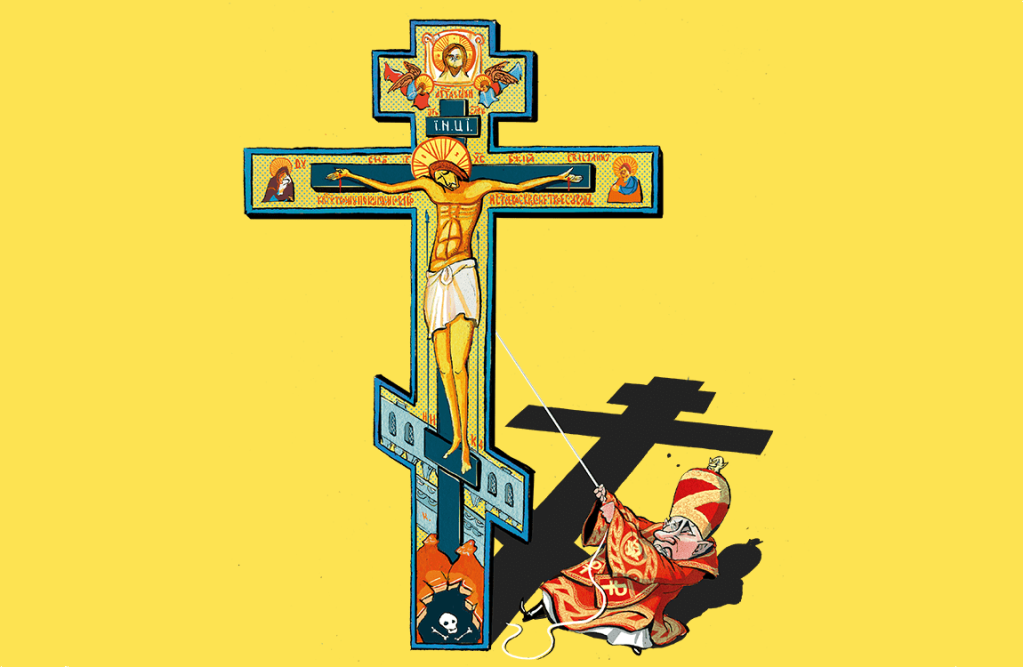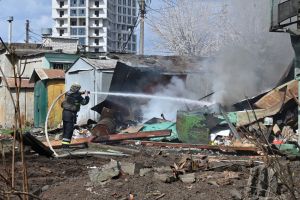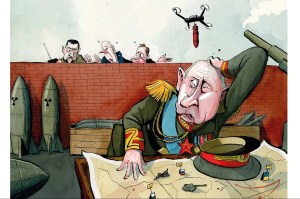“The photographs of murdered civilians, their hands tied behind their backs, shot in the head and tossed like animals on to the street… we will not forget, and no one will let us forget,” wrote Russian journalist and author Yevgenia Albats last week. “The guilt for this will lie on our children and grandchildren. Bucha, Irpin, Motyzhin — we will now have to live with them for ever.”
Powerful words and moving nostra culpa for Russian atrocities in Ukraine. But they raise a vital question. Who, exactly, is the “we” who is to bear the blame, guilt and punishment? All Russians? The 70 percent of Russians who official polls claim actively support the war? Russian soldiers responsible for the atrocities? The commanders who ordered, or at least condoned, them? Or is it just Vladimir Putin and the very tiny clique who conceived and launched the invasion?
Yevgenia Albats is one of the very few Russians who have written publicly of her whole people’s need for “repentance,” “guilt” and “shame.” But she is also one of the very few Russians who has passionately and publicly opposed the war — and spent a career, as editor of the now-banned New Times independent newspaper, exposing the brutality and corruption of the Putin regime, in particular its venal and murderous secret police. If any Russian is free from guilt by association, it’s Albats and people like her.
The Russians who are actually most responsible are the ones who feel the least guilt. The nihilists and the cynics, the conspiracy theorists and the my-country-right-or-wrong crowd. Russians’ self-delusion comes in a rainbow of dirty colors — from the “all media is lying” and “guilt on both sides” brigade to the outright Russian patriots who believe that their country’s historical destiny is to protect and dominate little brother peoples on the peripheries of the old empire. Crisis is a great revealer of people’s true nature. And as it turns out, all kinds of surprising old Russian friends — people whom I had thought bohemian, charming, international, well-informed — have shown themselves to be obnoxious apologists.
“This Bucha looks too perfect, at least the way it was produced,” writes one Muscovite who has lived in Europe for twenty years. “Bodies clean? Moving hands? Cars burned and clean beside each other? I am not saying it didn’t happen, but they should focus on what has happened to all the villages cancelled from the map…”
She meant the villages of Donbas supposedly wiped out by Ukrainian forces after the 2014 war. I pointed out that indeed two million out of the pre-2014 three million-strong population of Donbas moved away in the wake of the separatist war, which left some 14,000 dead. But that was eight years ago. I add links to UN reports — signed off on by Russia — of recent civilian casualties in Donbas. The death toll for 2021: twenty-five civilians on both sides of the line of control, mostly killed by unexploded ordnance.
“Owen, have you seen any of the content, blocked by every country but Germany, of what is really happening in Ukraine? Hundreds of civilians tortured for years?” is her reply. “Five bodies cannot become the end of the world after everything that the world has been doing for years. Sorry… It is about fair conflict: Russia against everyone.”
And the video evidence of the Bucha massacre — fake or not?
“Most people who work in the [media] industry noticed the same, so we are not drugged strangers,” she claims. I send a video conclusively debunking the Russian conspiracy theory that corpses in Bucha supposedly moved their hands and sat up. The YouTube link features the now infamous image of a dead woman’s hand with painted fingernails emerging from the ground.
“Darling, it is not about perfect nails,” comes the answer, followed by a smiley face that makes me choke with fury.
This conversation continues for some days, my now former friend leaping like a retreating frog from one conspiracy to another. In the end we get to the heart of the matter. She is Russian. She believes (rightly) that the world is against her country. And she will defend it, against all evidence, because she believes that her nation is an essential part of her self-worth.
That’s the key to understanding why so many Russians believe the outlandish propaganda that the Kremlin media machine puts out. Not because they are unusually stupid or gullible people. Not because they don’t have access to alternative information (which, despite internet access bans, is accessible through free VPNs or secure phone apps like Telegram). Yes, the Kremlin systematically misleads them. But this works because so many Russians are happy to be misled. A tragically large proportion of the population are actively complicit in their own delusion. They want to believe that their country is great and right — and anyone who says different is an enemy and a traitor.
When you see the world through blinkers, knowing the truth does not make you free. Yevgeny Popov is the co-anchor of 60 Minut, Russia’s top-rated TV politics talk show on the state-owned Rossiya-1 channel. He has lived in Washington and Kyiv and speaks fluent English. His newsroom receives live video feeds from AP, Reuters, AFP, the BBC and every other western channel. Yet Popov apparently sincerely believes that the entire western media is engaged in a vast conspiracy to blacken his country’s name. “Your media have dumped a storm of hatred on Russia — and in doing so you have buried the very idea of professional journalism,” Popov told me on the phone last month. “You accuse us of not having a free press — but every one of your reports from Ukraine proves that it’s you who have no free press.”
Our fury and revulsion at the massacres of Bucha and Kramatorsk demand action. We find ourselves confronted with what Lenin called the “cursed Russian questions” — what to do, and who to blame? But the moment we start to act and mete out punishment, for instance in the form of sanctions, we find that the question is thrown back in our faces. Are we a society that punishes people for their nationality? For their political views? For the actions of leaders against whom they are powerless? Isn’t the idea of collective punishment and confiscation of property without due process something deeply antithetical to the very notion of a free, law-based society that the Ukrainians are fighting to defend?
Let us be under no illusions. Sanctions against Russia will be devastatingly effective in destroying its economic growth and crippling its industries. But the idea that the mass of Russians will rise against their leaders because they have been deprived of McDonald’s, Ikea, Zara, Apple Pay and foreign travel is, sadly, fanciful. Indeed the idea that Putin is protecting his people from a western assault will only be reinforced, in a perverse way, by the coming privations. True, hundreds of thousands of educated, wealthy Russian professionals have seen their comfortable lives and careers collapse. Up to 250,000 have voted with their feet and left the country. Terrible for Russia’s future and for them — but not a revolution.
No. Sanctions on Russia and on Russians abroad are about punishment — about making people, a people, suffer for their support for a monstrous regime and its violent outrages. It’s also about deterrence. According to a senior source close to the Chinese government, Beijing has been shocked both by the West’s resolve in imposing sanctions and also by the devastating effect that non-state sanctions by private companies have had on Russia’s economy. An invasion of Taiwan now looks like an economically suicidal option. Sanctions may not be effective in bringing swift regime change in Moscow. But not to impose them and continue with business as usual would create a terrible moral hazard for the world.
The trickier question is how to deal with individual Russians and Russian institutions. Take Zima Russian restaurant in Frith Street in Soho, London, which is owned and run by Russian investors who have nothing to do with the Putin regime. Over the years Zima and the brilliant eponymous Russian-language magazine it runs have become a focal point for opposition activists, journalists and writers who have fled the country and settled in Britain’s capital. Its chef and founder, Alexei Zimin, regularly cooks and sells meals for the benefit of Ukrainian refugees, and its profits since the beginning of the war have been donated to the Ukrainian Red Cross. Yet over the past month people have taken to calling up to berate the restaurant for serving borscht (traditionally a Ukrainian dish) and more generally to abuse the staff for Russia’s aggression — despite the fact that most of them are, in fact, Ukrainian.
Oligarchs are more complicated. The British press wants to see wealthy Russians kicked out of their mansions and shunned by society, their bank accounts frozen and golden visas suspended. Wealthy Russians in the UK are easy targets — all the more so because we know that London’s financial center has, in Oliver Bullough’s memorable phrase, been “butler to the world” and chief accessory to the wholesale plundering of Russia by its elites. Their downfall elicits much schadenfreude and little sympathy.
But what of wealthy Russians who oppose Putin? One Russian friend, who lives in a handsome mansion in Kensington, fled Moscow a decade ago after his business was stolen by the FSB. He cannot return to Russia for fear of arrest, but he has had his UK bank accounts frozen despite not being sanctioned in any way. He remains philosophical. “Smite all Russians and let God sort them out, is the principle,” he sighs. “I can understand why people think like that.”
On Novinsky Boulevard in Moscow, posters falsely claim that “Chekhov has been canceled in Europe.” Kremlin-controlled media reports that Russian students have been expelled from European universities and tourists abused. It’s important not to allow any claims that the West is succumbing to virulent Russophobia or cancelling Russian culture to become true. Since it is Easter, a time of redemption, let us put the way forward in religious terms. By all means smite the unrepentant sinners. But remember that many Russians — including many who live in Europe — are not only opponents of Putin but his victims.
This article was originally published in The Spectator’s UK magazine. Subscribe to the World edition here.


















